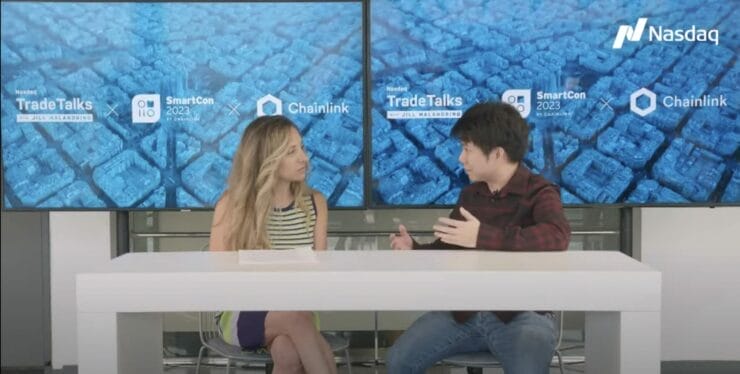SmartCon 2023 featured more than 100 blockchain experts and financial industry leaders including founders of influential protocols in the Chainlink ecosystem. To get a closer look at the future of web3, Nasdaq TradeTalks host Jill Malandrino filmed a two-day interview lineup with speakers at this year’s event in Barcelona, Spain.
Ben Chan, Vice President of Engineering at Chainlink Labs, sat down with Malandrino to talk about why Chainlink’s decentralized infrastructure is fundamental to DeFi’s evolution and how Chainlink’s newly launched Data Streams can take decentralized applications to the next level.
When asked what led him to Chainlink Labs, Chan said his interest in web3 was piqued around 2012 by the promise of Bitcoin. “I was really captivated by the fact that there was finally this single source of truth which you could build on top of,” he said. After several years as CTO of custody startup BitGo, Chan was drawn to DeFi in 2019.
“I felt like DeFi was going to be huge. That’s when I joined Chainlink. It was four years ago now, but I remember very clearly that I felt like Chainlink would be the greatest piece of infrastructure that would power DeFi going forward.”
He underscored Chainlink’s decentralized data, automation, and randomness as key building blocks for decentralized systems that are more efficient, transparent, and fair. In his view, the question isn’t “Why decentralize?” but “Why not decentralize?”
Reflecting on Chainlink’s success over the past four years, Chan highlighted Chainlink Data Feeds, which have securely enabled more than $8.8 trillion in transaction value throughout the DeFi economy.
The next generation of Chainlink data is Data Streams, a pull-based oracle solution through which high-frequency market data is continuously made available offchain and pulled onchain as needed. This allows decentralized applications to consume data more cost-effectively and at lower latencies while reducing the risk of frontrunning and MEV.
“I’m very proud of the team,” Chan said of over 230 engineers who worked to develop the product over the past year.
“It provides a complete re-architecture of what people are used to. It allows us to deliver data feeds at a high frequency, so several times a second. It allows us to deliver them very cheaply and to scale that to many more chains.”
Chan told Malandrino he expects Data Streams will unlock a new tier of time-sensitive decentralized applications that require low-latency data. “I’m excited to see all these new applications that come in,” he said.
Watch Jill Malandrino’s full interview with Ben Chan.


